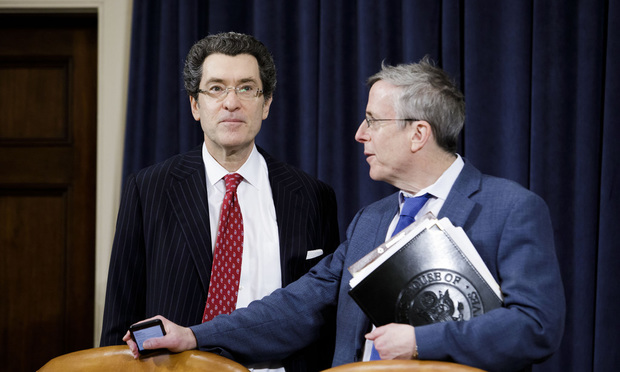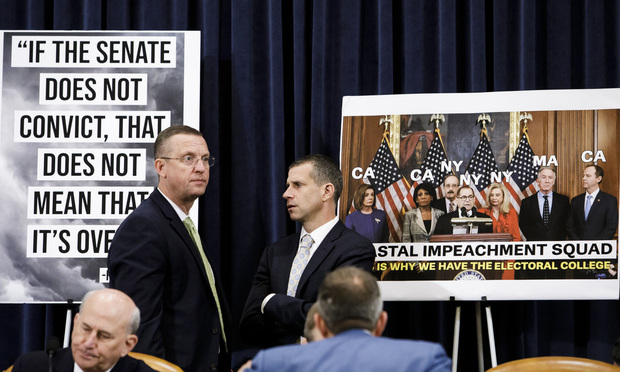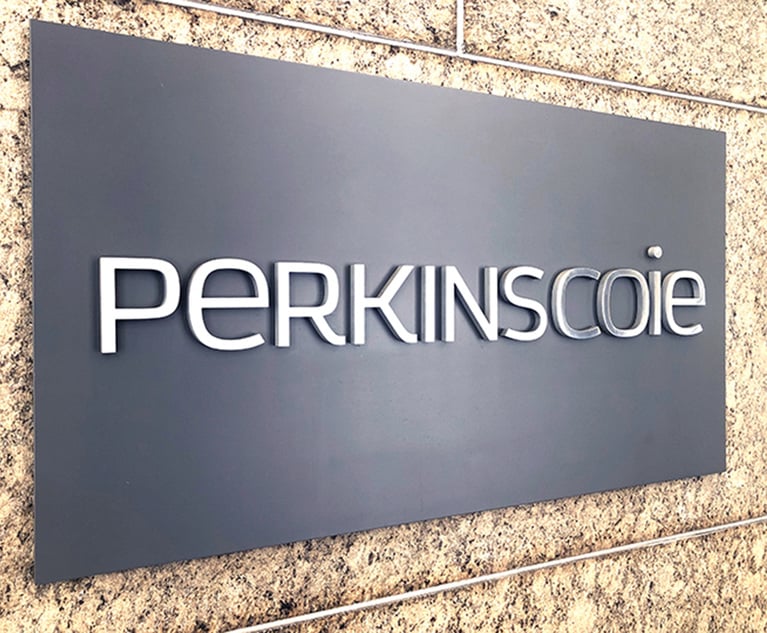The House Is Set to Impeach Trump. These Lawyers Helped Democrats Get There
The lawyers remained an active presence in the room as the House Judiciary Committee began debating the articles of impeachment this past week.
December 13, 2019 at 05:23 PM
7 minute read
 Norm Eisen, counsel to the Democrats, left, during a House Judiciary Committee Impeachment Inquiry hearing into President Donald Trump featuring testimony from Steve Castor, counsel to the Republican minority of the House Judiciary Committee, Daniel Goldman, counsel to the Democrat majority of the House Intelligence Committee, and Barry Berke, an attorney for the majority with the House Judiciary Committee, on Capitol Hill, in Washington, on Monday, Dec. 9, 2019. Photo: Diego M. Radzinschi/ALM
Norm Eisen, counsel to the Democrats, left, during a House Judiciary Committee Impeachment Inquiry hearing into President Donald Trump featuring testimony from Steve Castor, counsel to the Republican minority of the House Judiciary Committee, Daniel Goldman, counsel to the Democrat majority of the House Intelligence Committee, and Barry Berke, an attorney for the majority with the House Judiciary Committee, on Capitol Hill, in Washington, on Monday, Dec. 9, 2019. Photo: Diego M. Radzinschi/ALM
As the House prepares to pass articles of impeachment against President Donald Trump, a handful of legal staffers typically relegated to behind-the-scenes action have found themselves at the center of the political spectacle.
Outside lawyers and investigators hired by Democrats have emerged as both witnesses and questioners during the House's impeachment inquiry.
Lawyers have been a running theme throughout the House's impeachment inquiry. Staff led the questioning of fact witnesses during the closed-door depositions. And lawyers also starred in the two public hearings the House Judiciary Committee held, before they started considering the articles of impeachment.
Two former federal prosecutors from the Southern District of New York, Daniel Goldman and Daniel Noble, led the Democratic questioning of witnesses behind closed doors. They were hired to work on Democratic investigations, before impeachment was fully on the table, but pivoted to handle the inquiry.
"It made all the difference," Democratic Rep. Peter Welch, a member of the House Intelligence Committee, said of the investigators' work during the closed-door depositions and public hearings.
"There was focused preparation and focused questioning, and I think in the Intelligence Committee you saw the immense benefit of it, where we're able to largely focus on the facts and the information with a minimum focus on self-serving speeches by members," Welch said.
Lawyers Norm Eisen and Barry Berke played a significant role once the House Judiciary Committee took over the inquiry. Eisen questioned a panel of constitutional scholars, while Berke both delivered an opening statement on the evidence presented in the probe and then questioned congressional investigators.
Those lawyers too were hired before the Ukrainian-based impeachment inquiry took shape, instead working on lawsuits seeking information to help bolster a Mueller-focused impeachment. But they too shifted to home in on Ukraine. And other attorneys, such as impeachment expert Joshua Matz and former House Judiciary Committee staffer Ted Kalo, came on board to help.
Harvard's Laurence Tribe, who co-authored a book on impeachment with Matz, also visited Washington over the weekend to speak with lawmakers about the evidence gathered in the inquiry and the potential articles against Trump.
Berke's dual role became a point of contention for some GOP members of the Judiciary Committee, who objected to him playing either part. Georgia Rep. Doug Collins and other Republicans have long opposed the use of staff questioning, asking during the passage of committee rules that established the procedure during impeachment hearings why counsel should be given more time for questioning than elected members of Congress.
While Democrats have sought outside help to assist their existing legal staff, Republicans have chosen to rely on their existing committee counsel.
 Ranking Member Rep. Doug Collins, R-Georgia, left, and Minority Counsel Stephen Castor, right, during a House Judiciary Committee hearing to debate two articles of impeachment against President Donald Trump, and the Republican-proposed amendments, on Thursday, Dec. 12, 2019, inside the Longworth House Office Building in Washington, D.C. Photo: Diego M. Radzinschi/ALM
Ranking Member Rep. Doug Collins, R-Georgia, left, and Minority Counsel Stephen Castor, right, during a House Judiciary Committee hearing to debate two articles of impeachment against President Donald Trump, and the Republican-proposed amendments, on Thursday, Dec. 12, 2019, inside the Longworth House Office Building in Washington, D.C. Photo: Diego M. Radzinschi/ALMGOP counsel Stephen Castor, a longtime House staffer who's working for top Trump ally Rep. Jim Jordan, has been a steady presence during both public and private hearings. He led the Republican questioning of witnesses during the closed-door depositions and was temporarily lent to the Intelligence Committee so he could interview witnesses during the public hearings.
Judiciary committee counsel Paul Taylor also had a moment in the spotlight, as he questioned Castor and Goldman during a hearing this week on evidence gathered as part of the inquiry.
As House Judiciary Committee members began debating the articles of impeachment, the lawyers remained an active presence in the room. A pair of committee counsel consistently flanked Nadler and Collins on the dais, while others sat behind the row of seated lawmakers.
Republican lawyers in particular, such as Castor and fellow GOP Judiciary Committee counsel Ashley Callen, deliberated with both members and fellow staff during the markup of the articles. Democratic staff members, such as Arya Hariharan, similarly consulted with members throughout the hearing.
Rep. David Cicilline, a Judiciary Democrat, said those consultations were largely about the evidence from the investigation, as well as guidance on the "prevailing legal standards and about the constitutional provisions."
"The kind of traditional work a lawyer would do in this kind of a proceeding," he added.
Republicans have invoked the constitutional law scholars' testimony, given last week, during the deliberations on the articles of impeachment. Several mentioned George Washington University law professor Jonathan Turley's remarks about the inquiry, including his warnings about the speed of the proceedings.
But Republicans were generally critical of the heavy reliance on legal experts and staff lawyers. They said the House Judiciary Committee should have called fact witnesses to testify, rather than relying on advice from the constitutional law scholars and evidence presented by committee counsel.
"We've got law professors and staff asking staff questions," said Rep. Andy Biggs, chairman of the conservative Freedom Caucus, in criticizing the proceedings.
The staff lawyers have also gained a sort of internet celebrity through the impeachment proceedings. Those who support the impeachment inquiry used Twitter to cheer questioning by Berke.
Castor also gained notoriety when a clip of him showing up to testify using a The Fresh Market grocery bag to carry his belongings went viral.
The Judiciary Committee itself is full of lawyers. Rep. Jamie Raskin, a constitutional law scholar, at one point spoke to offer "constitutional context" about the House's investigative powers, describing the U.S. Supreme Court's decision in United States v. Nixon, which affirmed the House has the authority to conduct its own impeachment proceedings in the way of its choosing.
And Rep. Eric Swalwell, a member of both the House Intelligence and Judiciary committees and a former local prosecutor, said he misses being in court because "you had judges that could rule on evidentiary matters, you don't have that here."
"Facts and evidence matter, and sure, you have to make the case to the American people," Swalwell said. "But to be around people that have done that with juries, it just helps me, and I think my colleagues who did not practice, make the best case."
Read more:
Impeachment, Lawyers and the Views from the War Rooms
House Judiciary Just Added an Impeachment Scholar as Trump Inquiry Ramps Up
Bribery, Abuse of Power and Obstruction: Judiciary Committee Lawyers Lay Path for Impeachment
Barry Berke Makes House Debut With Lewandowski as Democrats Push Impeachment
This content has been archived. It is available through our partners, LexisNexis® and Bloomberg Law.
To view this content, please continue to their sites.
Not a Lexis Subscriber?
Subscribe Now
Not a Bloomberg Law Subscriber?
Subscribe Now
NOT FOR REPRINT
© 2025 ALM Global, LLC, All Rights Reserved. Request academic re-use from www.copyright.com. All other uses, submit a request to [email protected]. For more information visit Asset & Logo Licensing.
You Might Like
View All
Trump's DOJ Delays Releasing Jan. 6 FBI Agents List Under Consent Order
3 minute read
Judge Grills DOJ on Trump’s Birthright Citizenship Executive Order

Perkins Coie Backs Challenge to Trump's Ban on Transgender Military Service
4 minute read
Selendy Gay Files Lawsuit Challenging Trump's Workforce Reclassification EO
2 minute readTrending Stories
- 1Jury Awards $3M in Shooting at Nightclub
- 2How Clean Is the Clean Slate Act?
- 3Florida Bar Sues Miami Attorney for Frivolous Lawsuits
- 4Donald Trump Serves Only De Facto and Not De Jure: A Status That Voids His Acts Usurping the Power of Congress or the Courts
- 5Georgia Hacker Pleads Guilty in SEC X Account Scam That Moved Markets
Who Got The Work
J. Brugh Lower of Gibbons has entered an appearance for industrial equipment supplier Devco Corporation in a pending trademark infringement lawsuit. The suit, accusing the defendant of selling knock-off Graco products, was filed Dec. 18 in New Jersey District Court by Rivkin Radler on behalf of Graco Inc. and Graco Minnesota. The case, assigned to U.S. District Judge Zahid N. Quraishi, is 3:24-cv-11294, Graco Inc. et al v. Devco Corporation.
Who Got The Work
Rebecca Maller-Stein and Kent A. Yalowitz of Arnold & Porter Kaye Scholer have entered their appearances for Hanaco Venture Capital and its executives, Lior Prosor and David Frankel, in a pending securities lawsuit. The action, filed on Dec. 24 in New York Southern District Court by Zell, Aron & Co. on behalf of Goldeneye Advisors, accuses the defendants of negligently and fraudulently managing the plaintiff's $1 million investment. The case, assigned to U.S. District Judge Vernon S. Broderick, is 1:24-cv-09918, Goldeneye Advisors, LLC v. Hanaco Venture Capital, Ltd. et al.
Who Got The Work
Attorneys from A&O Shearman has stepped in as defense counsel for Toronto-Dominion Bank and other defendants in a pending securities class action. The suit, filed Dec. 11 in New York Southern District Court by Bleichmar Fonti & Auld, accuses the defendants of concealing the bank's 'pervasive' deficiencies in regards to its compliance with the Bank Secrecy Act and the quality of its anti-money laundering controls. The case, assigned to U.S. District Judge Arun Subramanian, is 1:24-cv-09445, Gonzalez v. The Toronto-Dominion Bank et al.
Who Got The Work
Crown Castle International, a Pennsylvania company providing shared communications infrastructure, has turned to Luke D. Wolf of Gordon Rees Scully Mansukhani to fend off a pending breach-of-contract lawsuit. The court action, filed Nov. 25 in Michigan Eastern District Court by Hooper Hathaway PC on behalf of The Town Residences LLC, accuses Crown Castle of failing to transfer approximately $30,000 in utility payments from T-Mobile in breach of a roof-top lease and assignment agreement. The case, assigned to U.S. District Judge Susan K. Declercq, is 2:24-cv-13131, The Town Residences LLC v. T-Mobile US, Inc. et al.
Who Got The Work
Wilfred P. Coronato and Daniel M. Schwartz of McCarter & English have stepped in as defense counsel to Electrolux Home Products Inc. in a pending product liability lawsuit. The court action, filed Nov. 26 in New York Eastern District Court by Poulos Lopiccolo PC and Nagel Rice LLP on behalf of David Stern, alleges that the defendant's refrigerators’ drawers and shelving repeatedly break and fall apart within months after purchase. The case, assigned to U.S. District Judge Joan M. Azrack, is 2:24-cv-08204, Stern v. Electrolux Home Products, Inc.
Featured Firms
Law Offices of Gary Martin Hays & Associates, P.C.
(470) 294-1674
Law Offices of Mark E. Salomone
(857) 444-6468
Smith & Hassler
(713) 739-1250








